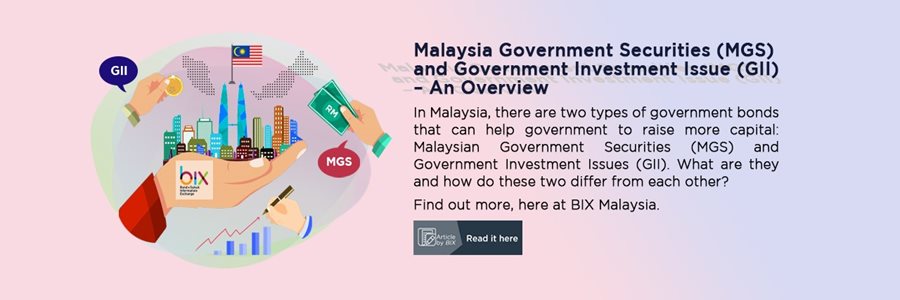
BIX ARTICLE
Malaysia Government Securities (MGS) and Government Investment Issue (GII) – An Overview
Feb 13, 2019
|
8 min read
Featured Posts
Social Bonds Illustrative Use-Of-Proceeds Case Studies Coronavirus
Jul 06, 2020
|
2 min read
Sustainable Banking Network (SBN) Creating Green Bond Markets
Jul 06, 2020
|
2 min read
Why is Inflation Making a Big Comeback After Being Absent for Decades in the U.S.?
Mar 24, 2022
|
7 min read
SC issues Corporate Governance Strategic Priorities 2021-2023
Mar 29, 2022
|
3 min read

The development of a country requires the government to raise funds from the capital market to finance the government's development expenditure, working capitals and promoting the growth of the country. In Malaysia, there are two types of government bonds that can help government to raise more capital: Malaysian Government Securities (MGS) and Government Investment Issues (GII). What are they and how do these two differ from each other?
What is government bond?
A government bond or sovereign bond is a debt security issued by a national government, generally with a promise to pay periodic interest payments and to repay the face value on the maturity date. Government bonds are usually denominated in the country's own currency, in which case the government cannot be forced to default, although it may choose to do so.
Risk in government bonds
Although government bonds carry little risk of default, they are not a risk-free investment, meaning that when interest rates rise, bond prices fall, and vice versa. As seen with Greece’s debt crisis, governments are not always able to produce more capital. And even when they can, it does not prevent them from defaulting on loan payments. But aside from credit risk, there are a few other potential pitfalls to watch out for with government bonds such as the interest risk, inflation risk and currency risk.
Read more on risk and return of investing in bond and sukuk here at BIX Malaysia Articles and Tutorials.
The impact of issuing government bonds
By selling bonds the treasury reduces the supply of money in the market. A reduced supply of money means less inflation. When the treasury sells a bond, it gives a bond away and accepts cash for it. This cash is then held by the treasury and not circulated within the market. As a result, there is less money available for banks to loan and inflation should be reduced.
If the supply of something is less than demand, the price rises. Think of inflation as the price of a money. If the supply of money is high, then inflation is greater. If the supply of money is low, then inflation is less. The market purchase of government bonds pushes the supply of money down, and therefore inflation is reduced.
Types of government bonds
The terminology surrounding bonds can make things appear much more complicated due to different countries use different terms for their government bonds.
UK government bonds, for example, are referred to as Gilts. The maturity of each gilt is listed in the name, so a UK government bond that matures in two years is called a two-year gilt.
In the US, meanwhile, government bonds are referred to as US Treasuries (UST). Treasuries come in three broad categories, according to their maturity:
- Treasury bills (T-bills) expire in less than one (1) year
- Treasury notes (T-notes) expire in one to ten (10) years
- Treasury bonds expire in more than ten (10) years
Objectives of government bond issuance in Malaysia
MGS were initially issued to meet the investment needs of the Employees Provident Fund (EPF), local banks and insurance companies. In the late 1970s and early 1980s, MGS were issued to finance the public sector's development expenditure. In contrast, by the 1990s, the purpose of MGS issuance was extended to funding part of the Government's budget deficit and prepayment of some of the Government's external loans. The Government continued to issue MGS during the fiscal surplus of 1993-1997 to meet the market demand for MGS.
GII and MITB, on the other hand, were issued to allow Islamic banks to hold liquid papers that meet their statutory liquidity requirements. The issuance of these papers also enabled them to invest their liquid funds in instruments that are issued adhere to Shariah principles as they are unable to purchase or trade in Malaysian Government Securities (MGS), Malaysian Treasury Bill (MTB) or other interest-bearing instruments.
Conventional Securities
Malaysian Government Securities (MGS)
MGS is coupon-bearing, long-term bonds issued by the Government to raise funds for development expenditures. They are the most actively traded bonds. The BNM regularly issues 3-year, 5-year, 7-year, and 10-year MGS as benchmark securities for the development of a benchmark yield curve. In addition, 15-year and 20-year have also been issued to lengthen the yield curve.
The central bank, Bank Negara Malaysia (BNM) in its role as banker and adviser to the Government, advises on the details of Government securities issuance and facilitates such issuance through various market infrastructures that it owns and operates. MGS are issued by tender via appointed principal dealers. Tendering is done through the Fully Automated System for Tendering, whereby the coupon rate is determined by the weighted average of the successful bids.
The tenure of MGS is normally medium to long term up to 30 years. MGS are fixed-rate, coupon-bearing bonds with bullet repayment of principal upon maturity. Coupon payments are made semi-annually. MGS are issued via competitive auction by Bank Negara Malaysia on behalf of the Government. Successful bidders are determined according to the lowest yields offered and the coupon rate is fixed at the weighted average yield of successful bids.
An annual calendar that outlines the timing, tenure and issuance method (new issue/re-opening) will be announced at year-end for subsequent year issuances to enhance market transparency and certainty. The actual issuance size will be announced a week before the issuance date. Typical issuance size ranges from RM1 billion to RM4.5 billion depending on the financing requirement of the Government.
The secondary market for benchmark securities is liquid with average transaction volume varying from RM100 million to RM500 million. A standard transaction is RM5 million per lot.
Malaysian Treasury Bills (MTB)
Short-term securities issued by Bank Negara Malaysia (BNM) for the government’s working capital requirements. MTB are issued with original maturities of 3-month and 6-month, and 1-year.
Islamic Securities
Government Investment Issues (GII)
GII is long-term non-interest-bearing Government securities based on Islamic principles issued by the Government of Malaysia for funding developmental expenditure. GII are issued through competitive auction by Bank Negara Malaysia on behalf of the Government. Funds are used for development expenditures. GIIs are issued with original maturities of 3-year, 5-year, 7-year, and 10-year.
Effective from 22 July 2013, GII is issued based on Murabahah concept. The GII issued prior to 22 July 2013, is based on Bai Al-Inah contract, is a trust certificate, arising from sell and buy back of asset in Islamic finance.
Murabahah contract is essentially a certificate of indebtedness arising from a deferred mark-up sale transaction of an asset, such as commodity (mainly crude palm oil), which complies with Shariah principles. This new issuance under Murabahah contract will involve commodity transactions to create indebtedness between the sukuk issuer and the investors. The explanation of the process flow can be seen below: -
- Under the issuance principle, the Successful Bidders will appoint BNM as their agent to purchase the commodity.
- BNM as the commodity agent will buy the commodity.
- Upon completion of the purchase, BNM on behalf of the Successful Bidders, will sell the commodity to Government at a mark-up price to be paid on deferred payment date.
- The obligation in contract form of the Government to settle the purchase price is securitised in the form of GII and is issued to the investors.
- Profit from the sale represents the coupon of GII, will be paid periodically such as semi-annual basis.
- On deferred payment date, the Government will pay the principal amount and final profit payable to the GII holders, to redeem the GII.
- Government will appoint BNM as their agent to sell the commodity at cost.
- BNM as the commodity agent will sell the commodity and remit the cash to Government.
Short-term securities, based on Islamic principles, issued by BNM. MITBs are usually issued on a weekly basis with original maturities of 10year.
MGS and GII: Side by side comparison
For more information on Malaysia’s government issuances, click BIX SEARCH tools in BIX Malaysia
using the steps below:
- Click the BIX SEARCH function on the front page.
- Under Category, select Government and click preferred issuance.
Disclaimer
This report has been prepared and issued by Bond and Sukuk Information Platform Sdn Bhd (“the Company”). The information provided in this report is of a general nature and has been prepared for information purposes only. It is not intended to constitute research or as advice for any investor. The information in this report is not and should not be construed or considered as an offer, recommendation or solicitation for investments. Investors are advised to make their own independent evaluation of the information contained in this report, consider their own individual investment objectives, financial situation and particular needs and should seek appropriate personalised financial advice from a qualified professional to suit individual circumstances and risk profile.
The information contained in this report is prepared from data believed to be correct and reliable at the time of issuance of this report. While every effort is made to ensure the information is up-to-date and correct, the Company does not make any guarantee, representation or warranty, express or implied, as to the adequacy, accuracy, completeness, reliability or fairness of any such information contained in this report and accordingly, neither the Company nor any of its affiliates nor its related persons shall not be liable in any manner whatsoever for any consequences (including but not limited to any direct, indirect or consequential losses, loss of profits and damages) of any reliance thereon or usage thereof.
YOU MAY ALSO LIKE
ARTICLE
Feb 04, 2026
|
4 min read
ARTICLE
Feb 03, 2026
|
8 min read
ARTICLE
Jan 30, 2026
|
6 min read
ARTICLE
Dec 22, 2025
|
6 min read


